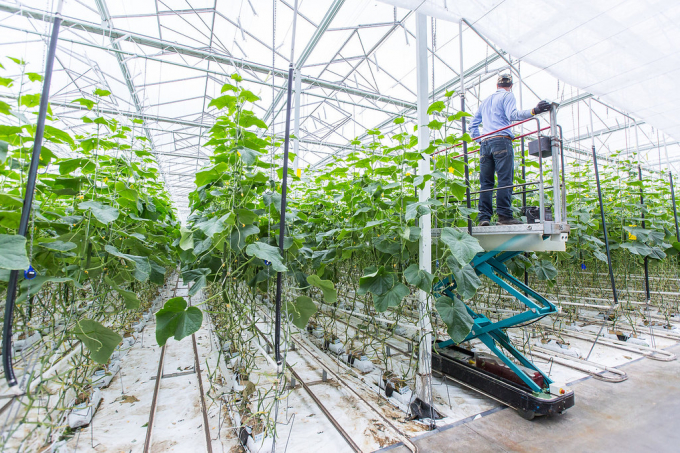November 28, 2025 | 01:00 GMT +7
November 28, 2025 | 01:00 GMT +7
Hotline: 0913.378.918
November 28, 2025 | 01:00 GMT +7
Hotline: 0913.378.918

Rows of herbs and lettuce growing in vertical farming machines at Cubic Farms' facility in Pitt Meadows, B.C. The province says it has updated the Agricultural Land Reserve (ALR) Use Regulation to allow for more intensive farming, known as vertical farming, where crops are grown in vertically stacked layers. Photo: Gian Paolo Mendoza/CBC
The B.C. government has announced changes to a land use regulation they say will create new opportunities for farmers to grow locally produced food.
In a press conference Saturday, the province said it had updated the Agricultural Land Reserve (ALR) Use Regulation to allow ALR land use for intensive crop production.
"There is a perception that growing systems such as vertical farms required approval of the ALC (Agricultural Land Commission). We will be updating the regulation to explicitly provide that crop production in a controlled environment structure is an allowable use on the ALR," the Ministry of Agriculture told CBC in an emailed statement.
According to the ministry, the changes will help increase local food supply through intensive farming or vertical farming, where crops are grown in vertically stacked layers to maximize space and reduce energy costs and greenhouse gas emissions.
Vertical farming could "make smaller pieces of land that are currently fallow more viable to grow on," the ministry said in a news release.
The ALR is a provincial zone that prioritizes agriculture as its main use. The regulation is designed to ensure food security, and protects approximately 4.7 million hectares of arable land in the province — presenting challenges for agritech farmers around accessing ALR lands.
"When the pandemic and recent climate change-related floods disrupted supply chains, British Columbians were reminded of the incredible bounty in our own backyard," Agriculture Minister Lana Popham said in a statement.
More than 150 agritech companies in B.C.

Opening opportunities for more vertical farms and innovative agritech practices in partnership with existing traditional farms helps solve our overall food security and food economy puzzle. Photo: Getty
Ravi Kahlon, minister of jobs, economic recovery and innovation, said by creating new opportunities for agritech companies to operate in B.C., the province is positioning itself to be a leader in finding innovative solutions to food security problems.
The province said agritech operations use technology and innovation, such as robotics for harvesting or controlled indoor growing systems, to produce more sustainable food, while using fewer resources.
B.C. has more than 150 agritech companies, including in areas of food processing, precision agriculture, bioproducts, food safety and traceability, and soil and crop technology.
"As the agriculture capital of B.C., we know in the City of Abbotsford just how important this industry and agritech is to our economy, community and food security in the province," said Abbotsford Mayor Henry Braun.
"Changes to the ALR regulation brings much-needed certainty and predictability for organizations to invest in and grow agritech in our community."
But Harold Steves, Richmond city councillor and co-founder of the ALR, is concerned by the changes, which he says could take arable land away from farmers who use more traditional agricultural methods.
"We're looking at losing land to agritech ... There's no question of that," he said.
Steves said the City of Richmond has been working to create more space on industrial lands by changing building requirements, specifically by permitting buildings in industrial zones to add another level to allow for space for agritech companies.
(CBC)

(VAN) A new study reveals how the simultaneous effects of ocean acidification, salinity and loss of oxygen are making the world more fragile.

(VAN) Hopes are growing that the creation of the first 3D turkey gut model could be a turning point in the battle against the virulent blackhead disease.

(VAN) Tyson, America’s biggest meat supplier, plans to shutter one of its largest beef processing plants as the industry continues to struggle with low cattle supplies and political pressure from Washington.

(VAN) New FAO study shows how digital solutions are empowering farmers and fishers to prevent losses and build resilient agrifood systems.

(VAN) Brazil's COP30 presidency pushed through a compromise climate deal on Saturday that would boost finance for poor nations coping with global warming but that omitted any mention of the fossil fuels driving it.

(VAN) Poultry farmers in the UK have been warned that they could face one of the worst winters yet for bird flu.

(VAN) Prices of main-crop paddy have risen sharply, with jasmine rice hitting 16,100 baht per tonne — the highest level in years.